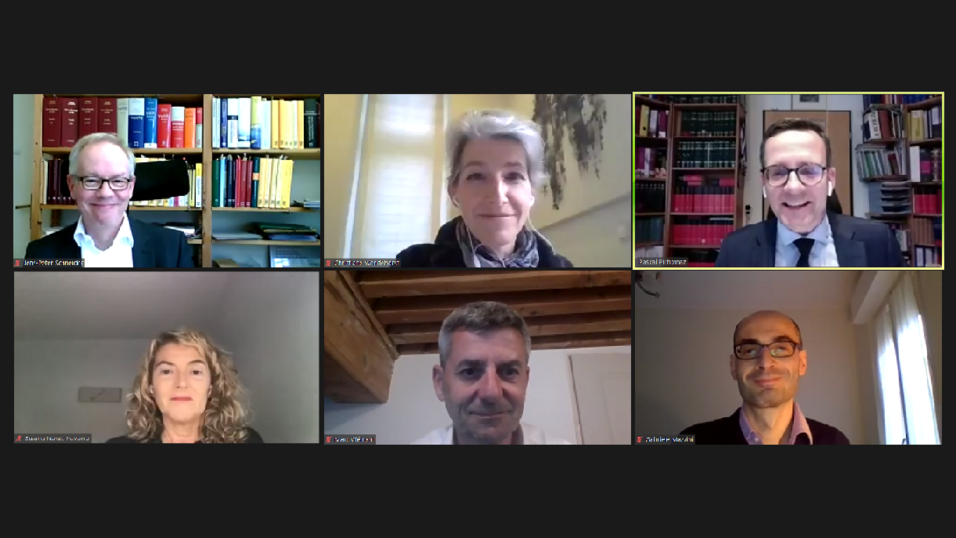The webinar provided an opportunity to analyse the Commission’ Proposal and its importance for ELI’s work in the field, in particular its project on AI and Public Administration – Developing Impact Assessments and Public Participation for Digital Democracy, building on the response to the European Commission’s public consultation on the White Paper ‘On Artificial Intelligence’.
Pascal Pichonnaz (Chair; Professor, University of Fribourg; ELI Vice-President) briefly presented the background of the Commission’s Proposal.
Gabriele Mazzini (Legal and Policy Officer; Unit on Artificial Intelligence Policy Development and Coordination, Directorate-General for Communications Networks, Content and Technology, European Commission) presented key aspects of the Proposal, emphasising in particular the risk based approach chosen to regulate AI. He emphasised that technology is beneficial and should be encouraged, but that it is important to adopt a balanced legal framework to regulate it, so that to raise trust towards the beneficial aspects of the technology. The Proposal does not aim at regulating the technology as such, but rather instances of its uses. Of the four risk levels identified, he focused in particular on high risks and requirements allowing for the use of such AI systems.
Christiane Wendehorst (Professor, University of Vienna; ELI President; Co-Author of the response to the public consultation) provided a brief analysis of the Proposal and its importance for ELI’s work. She welcomed the use of a risk based approach and said that further discussions as to detail solutions are required. Wendehorst referred to ELI’s response, which stressed the need to link the ‘safety risk’ dimension of AI (eg death, personal injury, damage to property etc caused by unsafe products or activities involving AI) to existing product safety legislation. She was of the view that the Commission proposal rightly takes that approach. She also welcomed the fact that the Proposal prohibits certain uses of AI, similarly to the suggestions in ELI’s response, and provided further suggestions for the possible development of the proposed rules.
Jens-Peter Schneider (Professor, University of Freiburg; Co-Reporter of the ELI project on AI and Public Administration; Co-Author of the response to the public consultation) provided a brief assessment of the proposal as well as its importance for ELI’s work, and referred to the first part of the response to the public consultation (ie ‘Regulating public use of AI applications’). In particular, he discussed whether the conformity assessment procedures applicable to high risk AI systems are appropriate for AI systems used by public authorities and considered procedures and standards for ex-ante and ex-post assessment of (high risk) AI systems. He opined that the proposed conformity assessment framework for AI systems deployed by public authorities, which mirrors the product safety one, might require further elaboration.
Marc Clément (Presiding judge at the Administrative Court of Lyon; Co-Reporter of the ELI project on AI and Public Administration; Co-Author of the response to the public consultation) focused on the broader significance of the proposal for ELI’s project on AI and Public Administration. Among other aspects, he discussed the importance of public participation in the context of public administration AI systems, as high risk systems may require public debate before adoption by administration. Clément stressed that there is an added-value in public debate for avoiding misunderstandings and creating the conditions for better adoption of tools. He also discussed the role of judges in the field, including substantial challenges ahead and the need for judges to be able to cope with technical expertise from definitions to assessment of technical documentation and risk management systems.
Susana Navas Navarro (Professor, Autonomous University of Barcelona) discussed in her presentation high value/quality data for AI and innovation. She emphasised that the quality of the data sets is essential to avoid discriminatory biases, in particular in case of machine learning systems. To achieve this, the data sets should be based on huge amounts of varied data. Currently, however, European companies cope with the scarcity of data. In her view, due to the excessive protection of information in Europe, high value data remains outside of the free flow of data, what limits the potential for innovation. In order for European companies to be able to innovate and compete on a global level, the EU should facilitate the exchange of data, while respecting fundamental rights.
During the Q&A session, participants raised several important questions, dealing with issues such as the flow of personal data used to create AI, a liability regime for AI and the interaction of the proposed Regulation with cybersecurity rules.
The webinar recording is available below.
The PowerPoint presentations from the event are available here:

